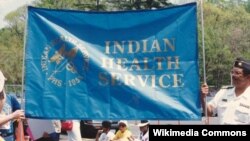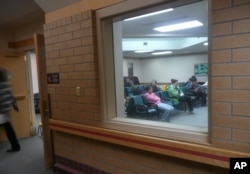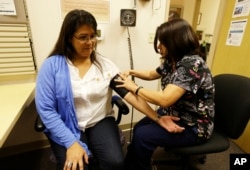There’s a saying among Native Americans who rely on the U.S. government for medical care: “Don’t get sick after June -- that’s when the federal money runs out.”
Adae Romero-Briones, associate director of Research and Policy for Native Agriculture for the First Nations, cites personal experience.
“How about the time my grandfather went in for cataract surgery -- they did one eye," she told VOA. But when he went in for the second eye, they told him funding had run out for the year and to try again the next year.”
The U.S. government is obligated to provide free health care to federally-recognized tribes in exchange for the millions of hectares of land they ceded to the government. The Indian Health Service (IHS), part of the Department of Health and Human Services (HHS), is the agency that provides that care. But the service has been plagued with scandal and accusations of mismanagement since it was formed more than 60 years ago, including the forced sterilization of Native American women in the 1960s and 1970s.
Staff shortages, faulty medical diagnoses, outdated equipment and crumbling facilities are just some of the problems tribal leaders described to the Senate Committee on Indian Affairs in a February hearing. Tribes say these are life and death issues for Native Americans, who die at higher rates from chronic liver disease, diabetes and respiratory disease and, with few exceptions, cannot afford private health insurance.
IHS struggles to attract and keep qualified physicians, who complain about low salaries, inadequate housing and long working hours. Medical staff can also find it difficult to accommodate traditional Native American healing practices.
South Dakota’s Rosebud reservation is among the worst cases cited: Its 45-bed hospital must serve more than 21,000 residents across more than 5,000 square kilometers. The state of health care was so dire in late 2015 that the IHS shut down its emergency room for several months, forcing tribal members seek emergency care in towns about 80 kilometers away -- a hardship for tribal members, many of whom live in poverty and lack transportation.
In 2016, the Department of Health and Human Services noted that one IHS hospital was so old that its plumbing had corroded, causing sewage to leak into the operating room.
Lawmakers in the Senate and House of Representatives have heeded calls for reform and in May introduced parallel bills calling for a complete overhaul of the IHS.
“The long history of failures at IHS are unacceptable and will not be tolerated,” Sen. John Barrasso (R-WY), co-sponsor of The Restoring Accountability in the IHS Act (S.1250) said in a statement May 25. “Our bill will ensure tribal members get the medical care they desperately need and deserve.”
The bill seeks to increase transparency and accountability at IHS, streamline the hiring of medical staff, provide incentives for doctors and nurses to stay on the job, and protect whistle-blowers who report violations of health and safety rules.
U.S. Representative Kristi Noem (R-SD) introduced an identical bill in the House. But similar legislation stalled during the Obama Administration, and tribes worry the latest bills will suffer the same fate.
Limited funding means the IHS must ration out the services it provides. VOA spoke with one Native American who praised the service.
“I've never had a bad experience and they have been my health care provider for many years,” said a Lakota woman who asked not to be named. “I believe the IHS is only as good as its funding.”
In his Fiscal Year 2018 budget request, President Donald Trump has asked for Congress to allocate $4.7 billion to the IHS. That’s $300 million less that the amount stipulated in the FY 2017 Consolidated Appropriations Act, which passed in early May.
In the meantime, IHS says it is taking these criticisms seriously. IHS Acting Director, Rear Admiral Chris Buchanan, recently outlined to Senators a number of initiatives to improve the quality of patient care. And on June 1, the agency announced it had hired a new chief medical officer who will be responsible for implementing new policies and monitoring compliance.











